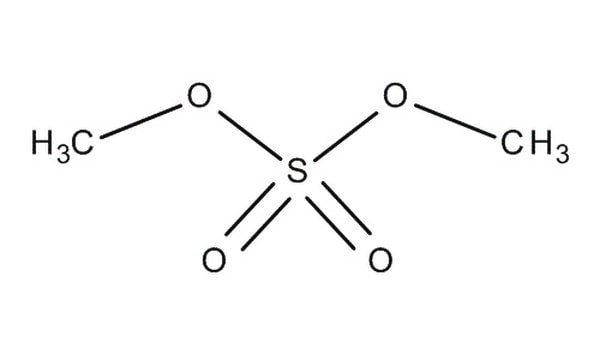41610
Dimethyl sulfate
puriss. p.a., ≥99.0% (GC)
Synonym(s):
Sulfuric acid dimethyl ester
About This Item
Recommended Products
vapor density
4.3 (vs air)
Quality Level
vapor pressure
0.7 mmHg ( 25 °C)
grade
puriss. p.a.
Assay
≥99.0% (GC)
form
liquid
autoignition temp.
923 °F
impurities
≤0.4% free acid (as H2SO4)
ign. residue
≤0.02%
refractive index
n20/D 1.386 (lit.)
n20/D 1.387
bp
188 °C (lit.)
mp
−32 °C (lit.)
solubility
ethanol: 0.26 g/mL, clear, colorless
diethyl ether: 1.3 g/5mL, clear, colorless
density
1.333 g/mL at 25 °C (lit.)
cation traces
Ca: ≤5 mg/kg
Cd: ≤1 mg/kg
Co: ≤1 mg/kg
Cr: ≤1 mg/kg
Cu: ≤1 mg/kg
Fe: ≤1 mg/kg
K: ≤20 mg/kg
Mg: ≤1 mg/kg
Mn: ≤1 mg/kg
Na: ≤20 mg/kg
Ni: ≤1 mg/kg
Pb: ≤1 mg/kg
Zn: ≤1 mg/kg
SMILES string
COS(=O)(=O)OC
InChI
1S/C2H6O4S/c1-5-7(3,4)6-2/h1-2H3
InChI key
VAYGXNSJCAHWJZ-UHFFFAOYSA-N
Looking for similar products? Visit Product Comparison Guide
Related Categories
General description
Signal Word
Danger
Hazard Statements
Precautionary Statements
Hazard Classifications
Acute Tox. 2 Inhalation - Acute Tox. 3 Oral - Carc. 1B - Eye Dam. 1 - Muta. 2 - Skin Corr. 1B - Skin Sens. 1
Storage Class Code
6.1A - Combustible acute toxic Cat. 1 and 2 / very toxic hazardous materials
WGK
WGK 3
Flash Point(F)
181.4 °F - closed cup
Flash Point(C)
83 °C - closed cup
Personal Protective Equipment
Choose from one of the most recent versions:
Already Own This Product?
Find documentation for the products that you have recently purchased in the Document Library.
Customers Also Viewed
Our team of scientists has experience in all areas of research including Life Science, Material Science, Chemical Synthesis, Chromatography, Analytical and many others.
Contact Technical Service












![N-[3-(Dimethylamino)propyl]methacrylamide 99%, contains MEHQ as inhibitor](/deepweb/assets/sigmaaldrich/product/structures/295/145/6b4aae15-7cb5-4b7b-9c06-8e6d24e50951/640/6b4aae15-7cb5-4b7b-9c06-8e6d24e50951.png)


